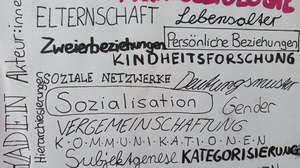The chair introduces itself
Microsociology deals with forms of communitization (Vergemeinschaftung) which, in contrast to the forms of socialization (Vergesellschaftung, e.g. organizations, nationally constituted societies or world society), are characterized by the immediacy of social contacts.
This applies to interactions whose duration is linked to the presence of the actors in a situation, and also to continuous social relationships in the form of dyads or groups. Microsociology also includes research fields that deal with the genesis of the subject, as is the case in socialization and biography research. Microsociology takes the actors in small social units and their actions, practices and meaning-making as the starting point for the search for answers to the question of how social order is created, perpetuated and reproduced. It is interested in the formation of typical individual and collective patterns of action and interpretation. Its aim is to decipher the “social grammars” that apply in different social units, also and especially against the background of numerous tendencies towards change in social forms of life in the dynamized contemporary societies of (post-)modernity.
 © Elena Simon
© Elena Simon
Chair of Micro-Sociology
The need to focus on "microscopic-molecular processes" in order to analyze society was already identified by Georg Simmel (1908: 15), one of the classics of the discipline, as a central field of work for sociology. He spoke out against defining sociology as a discipline that focuses exclusively on "large systems" and "supra-individual organizations" in its observations. Today, Simmel is still an important source of ideas and an almost inexhaustible source of inspiration for microsociology. Another important line of tradition in microsociology can be traced back to the Chicago School(s) of sociology.
Microsociology deals with forms of communitization which, in contrast to the forms of socialization (organizations, nationally constituted societies or world society), are characterized by the immediacy of social contacts. This applies to interactions whose duration is tied to the presence of the actors in a situation, and also to continuous social relationships in the form of dyads or groups. Microsociology also includes fields of research that deal with the genesis of the subject, as is the case in socialization and biography research. Microsociology takes the actors in small social units and their actions, practices and meaning-making as the starting point for the search for answers to the question of how social order is created, perpetuated and reproduced. She is interested in the formation of typical individual and collective patterns of action and interpretation. The aim is to decipher the "social grammars" that apply in different social units, also and especially against the background of numerous tendencies towards change in social forms of life in the dynamized contemporary societies of (post-)modernity. Almost all everyday social phenomena can become the subject matter, whereby the familiar is (re)problematized sociologically within the framework of the analysis. Understanding comprehension is a core task of microsociological analysis and at the same time poses a particular challenge, as every field of observation is already imbued with and shaped by the meanings of the actors. Alfred Schütz (1971) systematically took up this idea, which has far-reaching consequences for empirical social research, in his phenomenological sociology, which also forms a theoretical basis for microsociology.
The fields of micro- and macrosociology are often associated with the distinction between a frog's-eye view and a bird's-eye view. According to this, social phenomena can be viewed from the perspective of the actors or from the perspective of society. The distinction between these two perspectives also shows that it is not possible to clearly classify the so-called special sociologies. Rather, the fields of work of special sociologies are characterized by the fact that they encompass both micro- and macro-sociological issues. Family sociology is just one example of this. Family sociology falls into the field of microsociology when the family as a group or the embedded social relationships (e.g. parent-child relationship) are considered. If, on the other hand, the focus is on the family as a social subsystem, which is addressed in terms of its functionality for the overall system or in exchange with other subsystems, then this is a macrosociological issue.

